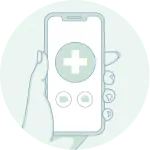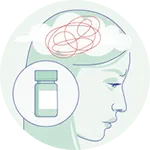General medical care
Ages 18-64
FSA or HSA eligible
Experience a personalized video consultation with a licensed clinician.
Convenient virtual care, including online prescriptions and renewals.
Transparent flat visit fee, eliminating unexpected bills (insurance not required).
Rest assured, your health data is safeguarded by our rigorous practices and legal protections.

Most popular treatments
Joint and back pain
Anxiety and depression Rx renewals
Stomach issues
Tooth pain
frequently Treated medical conditions

MUSCULOSKELETAL
Back pain
Low back symptoms
Neck pain
Plantar fasciitis (heel pain)
Pulled muscles
Sports injury
Sprains
Tendonitis

SKIN
Cellulitis
Dermatitis
Fungal infections
Inflammation
Minor injuries
Rash

RESPIRATORY
Allergy symptoms
Asthma symptoms
Bronchitis or chest cold
Cold and flu symptoms
Congestion
Cough
Fever
Runny nose
Sore throat (pharyngitis)
URIs

MANY MORE HEALTH CONCERNS
Altitude sickness
Dental pain relief and toothaches
Insomnia
Sleep
Tension headaches
Thrush

STOMACH (GI)
Acid reflux
Constipation
Diarrhea
Digestive problems
GERD
Heartburn
Irritable bowel syndrome (IBS)
Nausea
Stomach flu (gastroenteritis)
Upset stomach (dyspepsia)
Vomiting

INFECTION
Pink eye (conjunctivitis)
Sinus infections (rhinosinusitis)
UTI (women only)
Yeast infection

PRESCRIPTION RENEWAL
Asthma medications
Depression and anxiety medications
EpiPens
High blood pressure medications
High cholesterol medications
Hypothyroidism medications
Migraine medications
Complete the intake form.
Speak with a clinician without making an appointment.
Obtain a customised treatment strategy
Frequently Asked Questions
Which kinds of acute symptoms are not eligible for treatment via Optum Clinic?
Any of the following symptoms, which may point to a medical emergency, cannot be treated by your clinician:
• Breathing difficulties or respiratory distress (shortness of breath, wheeze)
• Chest pain or further heart attack or heart disease symptoms
• Lightheadedness or vertigo
• Feelings of causing harm to others or oneself
• Profound psychosis (delusions or hallucinations)
• Excruciating stomach discomfort
• Excruciating headache (the worst you've ever had)
• Palpitations, or rapid or erratic heartbeats
• Having trouble speaking or speaking slowly Numbness or drooping of the face
• Having trouble feeling or moving your arms or legs
• Allergic skin reactions (hives) that are accompanied by breathing difficulties, lip or tongue swelling
• Severe bleeding
Don't use Optum Health Clinic if any of these symptoms are present for you. You might require emergency medical assistance. Please contact the nearest emergency room or dial 911 as soon as you can. Please get the support you require.
Which kinds of medical conditions are not eligible for treatment with Optum Clinic?
At this point, the following kinds of medical conditions require that you seek treatment from a medical professional in person:
• Pregnancy-associated concerns
• Post-operative complications following surgery, hospital stay, or accident
• Symptoms related to the eyes, such as altered vision or soreness, swelling, or pain around the eyes
• GI bleeding that is abnormal (blood in stool)
• Pain in the ears or a potential infection
• Dizziness or vertigo
• UTIs (urinary tract infections) in men
• Open wounds from surgical procedures, animal attacks, punctures, or pressure injuries
• Sexually transmitted infection (STI) diagnosis
• Any mental health crises, including mania and psychosis
• Drug abuse detoxification
• Sleep apnea-related narcolepsy or insomnia
• Durable medical equipment (DME) prescriptions
• Documentation such as preoperative examinations, mental health records, FMLA papers, sports physicals, or medical notes for jury duty
Which kinds of drugs are not able to be prescribed via Optum Health Clinic?
• New prescriptions for mental health drugs or renewals of existing ones for conditions other than depression and/or anxiety (such as bipolar disorder or schizophrenia).
• Drugs for nerve discomfort, such as gabapentin
• HIV (PrEP) prescribed drugs
• Benzodiazepines, or anti-anxiety drugs, such as Xanax
• Antagonists of opioids, such as naltrexone
What distinguishes a refill from a renewal?
When your prescription runs out, a pharmacy can refill it. Your prescription must be renewed by a professional physician when you run out of refills. Via Optum Health Clinic, you can ask for a remote prescription renewal. To confirm a previous prescription, your clinician can ask for a picture or the phone number of the pharmacy.
What is Optum Health Clinic's prescription renewal policy?
Prescription renewals are usually written by clinicians for a 30-day supply of medication.
A prescription's medical appropriateness will be determined by your doctor based on a number of variables. They might inquire as to how long it has been since you've, for instance:
• Finished taking your prescription
• Visiting your PCP, or primary care physician
• Underwent the necessary laboratory testing
• You renewed your prescription through Optum Clinic the last time.
A clinician's ability to assess renewal requests might have a cap. Prescriptions that need prior authorization from your insurance company are not renewed by clinicians.
*You may only renew one or two prescriptions in a calendar year.
Is it possible for me to receive mental health treatment during a general medical visit?
No. Behavioral therapy, psychiatry, coaching, counseling, clinical social work, and other mental health specializations are not currently available for consultation through Optum Health.
You can ask for a prescription renewal for depression or anxiety medication if you've taken it within the last four days, but your clinician won't make any changes or start you on a new medicine.
Benzodiazepines, antipsychotics, mood stabilizers, and stimulant drugs for attention deficit/hyperactivity disorder (ADHD) will not have their prescriptions renewed by your clinician.
Please get medical help right away if you think you may be having a mental health crisis, or contact 911. On a round-the-clock basis, you can also reach the National Suicide Prevention Lifeline at 988. We hope you receive the support you require.
Which prescription drugs for anxiety and depression are renewed through Optum Health Clinic?
Your clinician may decide to renew prescriptions for the following antidepressants and anxiety drugs when it is medically necessary:
• Buproprion (Wellbutrin)
• Buspirone (Buspar)
• Citalopram (Celexa)
• Desvenlafaxine (Pristiq)
• Duloxetine (Cymbalta)
• Escitalopram (Lexapro)
• Fluoxetine (Prozac)
• Hydroxyzine (Vistaril)
• Levomilnacipran (Fetzima)
• Mirtazapine (Remeron)
• Paroxetine (Paxil)
• Propranolol (Inderal)
• Sertraline (Zoloft)
• Venlafaxine (Effexor XR)
• Vilazodone (Viibryd)
• Vortioxetine (Trintellix)
What occurs if my doctor is unable to identify or address my health problem?
Before proceeding with your visit, you'll need to review and sign a document outlining the various treatments and diagnoses we don't address. This ensures that you're fully aware of what we won't treat prior to payment. By doing so, you'll have the opportunity to reconsider if we're unable to assist you, thereby avoiding payment for the visit.
Can I pay for a visit or prescription drugs with my health insurance?
At this time, Optum Clinic does not accept health insurance for visits. Although we cannot promise it, you can make a claim to your insurance company for compensation. If you typically pay for your prescription drugs with insurance, you can do the same with those that are prescribed by Optum Clinic.
How does Optum Clinic protect my health information?
Optum Clinic protects your health information by strictly following the requirements of the Health Insurance Portability and Accountability Act (HIPAA). HIPAA governs what Optum Clinic and your healthcare providers can do with your medical information, as well as your contact and payment information. Optum Clinic doesn’t and will never sell your personal information. Learn more on our privacy page.
